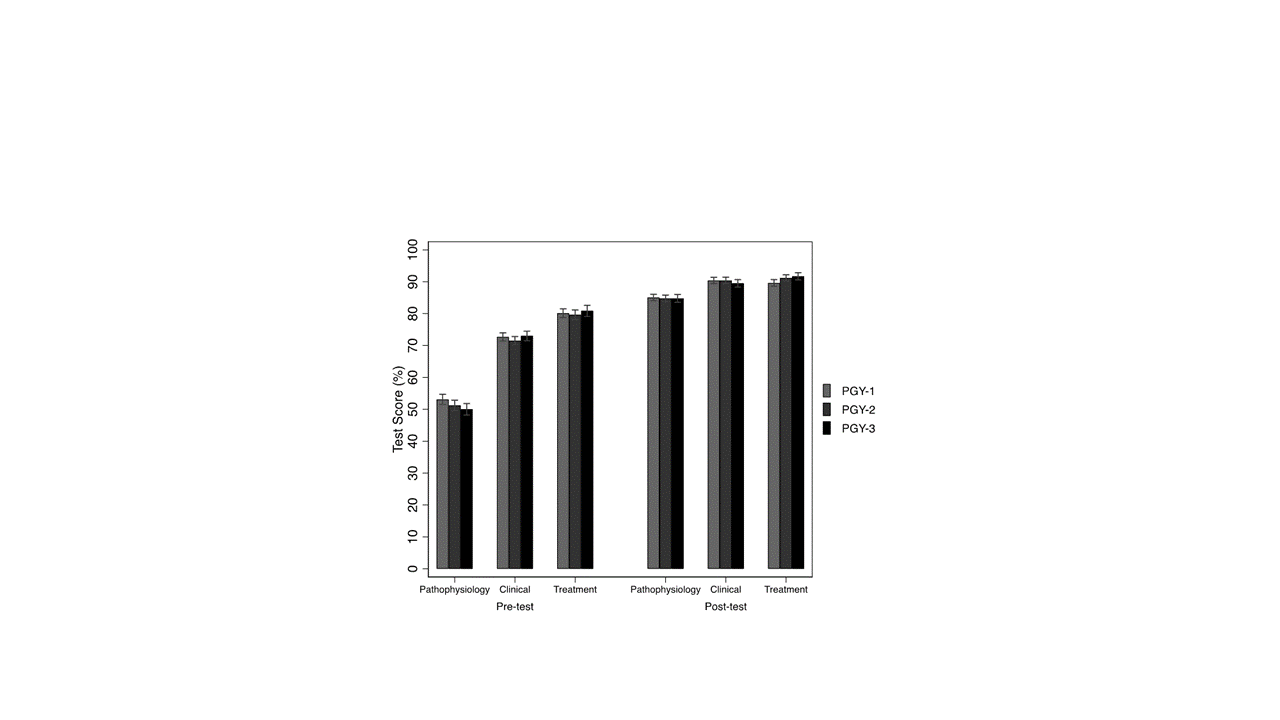Session Information
Session Type: ACR Concurrent Abstract Session
Session Time: 2:30PM-4:00PM
Background/Purpose: Gout is a leading form of inflammatory arthritis. There is a paucity of data that examines the efficacy of teaching internal medicine (IM) residency trainees about the diagnosis and management of gout.
Methods: The Johns Hopkins Physician Education & Assessment Center was established to deliver an internet-based curriculum in Ambulatory Medicine to subscribing internal medicine residency training programs. A didactic module on the diagnosis and management of gout, including clinical manifestations, epidemiology, risk factors, pathophysiology and therapeutic approaches to gout care was added to the curriculum in 2017. This module included a pre-test and post-test, both consisting of 10 multiple-choice questions. We examined baseline (pre-test) and post-test scores after completing the gout module according to postgraduate year (PGY) of training, program size, and month of year the module was completed, for participating trainees in 2017 and 2018.
Results: A total of 3,612 trainees (PGY1 1334; PGY2 1273; PGY3 1005) at 148 IM residencies completed the gout module. Overall, mean score on the pre-test exam was 71% compared to 88% on the post-test exam (p<0.001). Aggregate pre-test scores did not differ, meaningfully or statistically, by PGY year. Further, scores were higher at the start of the academic year (i.e., July, August) than at its conclusion (i.e., April, May). While baseline knowledge of diagnosis and management of gout was not different between PGY1 and PGY3 trainees, PGY1 residents had higher baseline knowledge on the pathophysiology/epidemiology content area; mean PGY1 score was higher than the PGY3 score, at 53% compared to 50% (p<0.05), respectively. Both groups improved to a mean score of 85% on the post-test exam. Further, the figure and table below, demonstrate the ability of all trainees, regardless of PGY status, to increase their knowledge score after module completion, overall and in each content area.
Conclusion: This web-based gout curriculum is effective at increasing subject knowledge for all trainees, overall and by content-specific areas. Yet, inasmuch as baseline knowledge of gout was not higher at each successive year of training, this suggests a lack of effective training on the diagnosis and management of gout during IM residency training. Further, enrollment in the gout module earlier, rather than later, in residency training may enable earlier acquisition of gout knowledge, and improved patient outcomes in gout-related care.
To cite this abstract in AMA style:
Gelber AC, Tang O, Haque U, Bertram A, Sisson S. Efficacy of a Web-Based Module to Educate Internal Medicine Housestaff on Gout [abstract]. Arthritis Rheumatol. 2018; 70 (suppl 9). https://acrabstracts.org/abstract/efficacy-of-a-web-based-module-to-educate-internal-medicine-housestaff-on-gout/. Accessed .« Back to 2018 ACR/ARHP Annual Meeting
ACR Meeting Abstracts - https://acrabstracts.org/abstract/efficacy-of-a-web-based-module-to-educate-internal-medicine-housestaff-on-gout/


